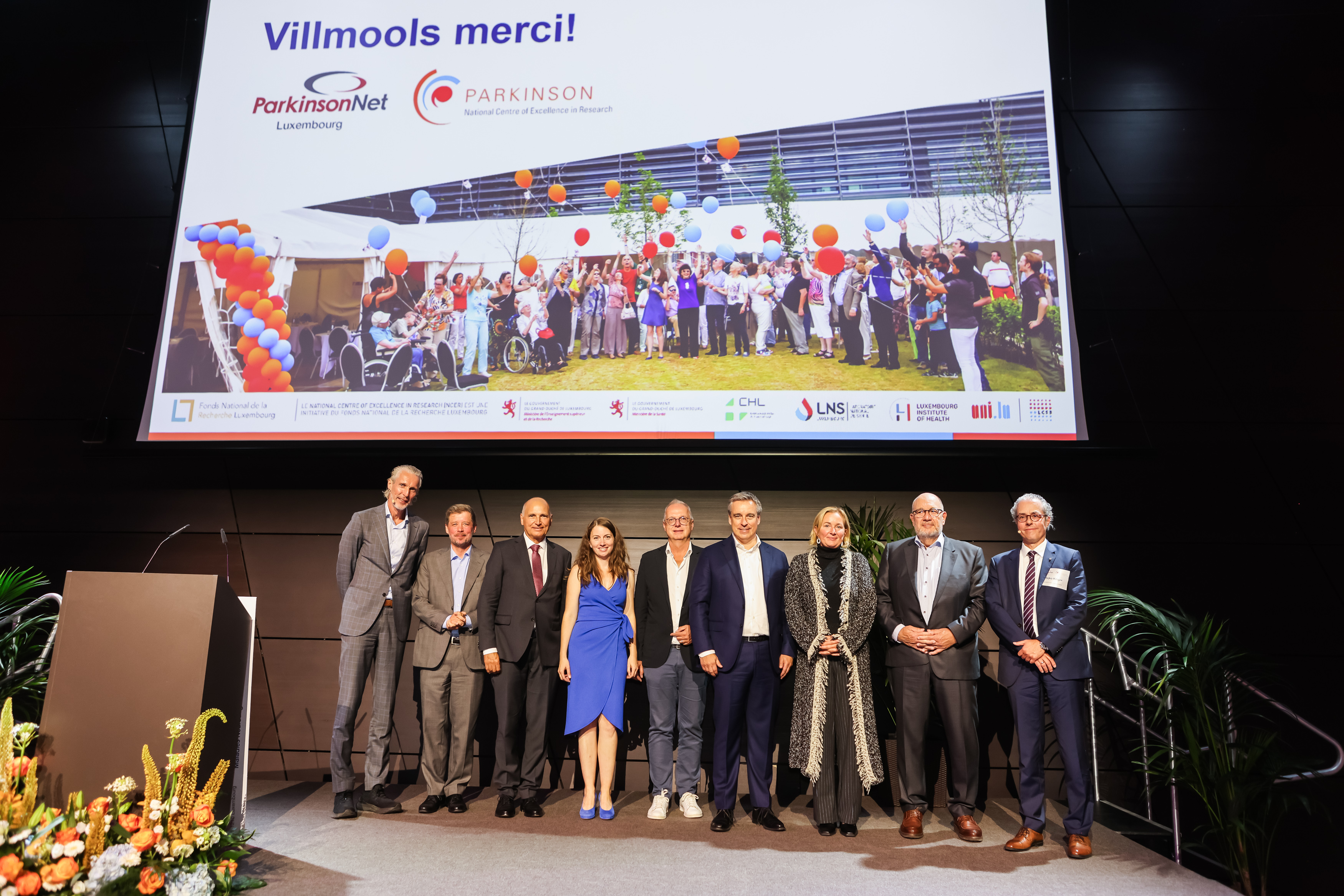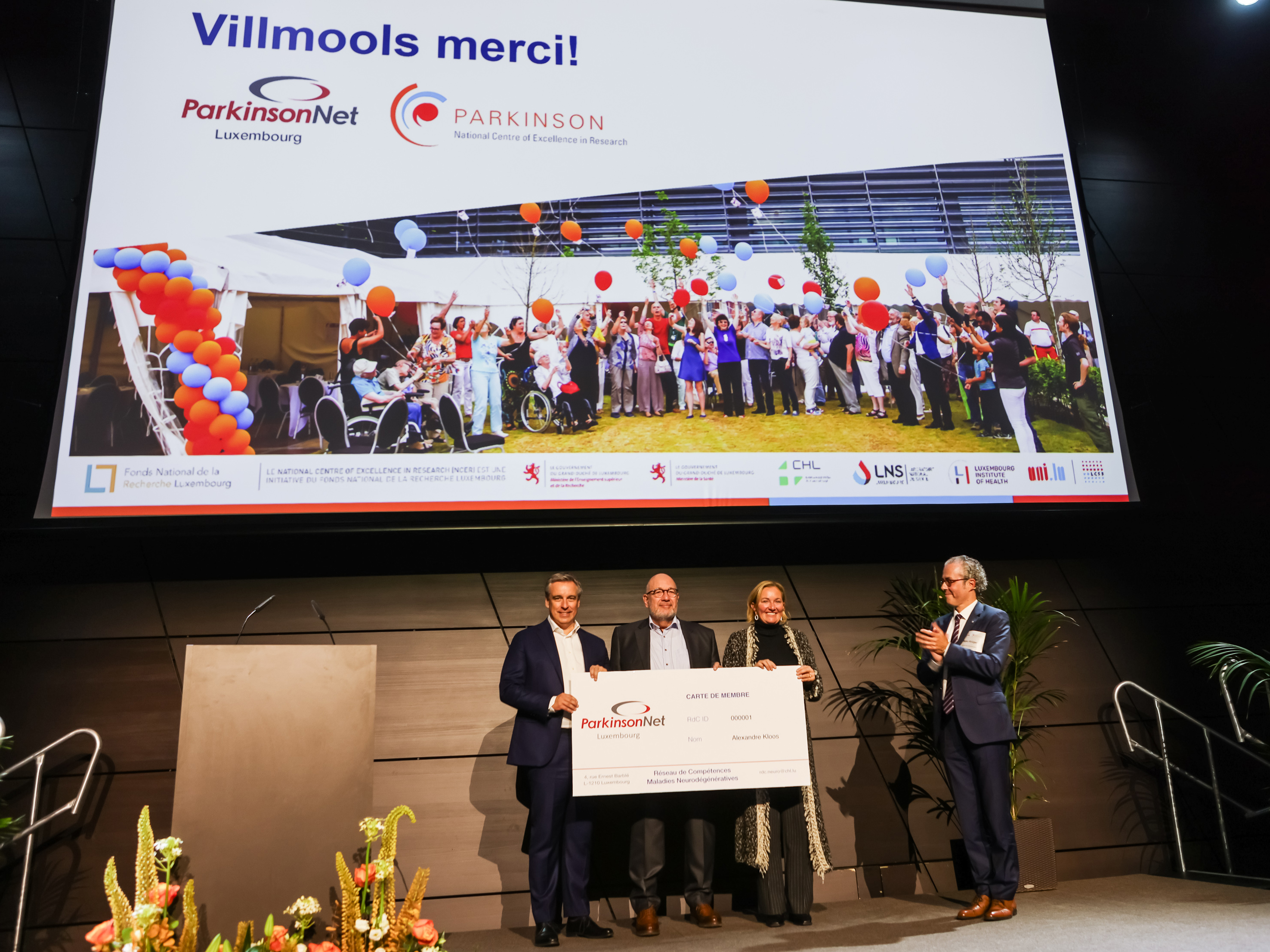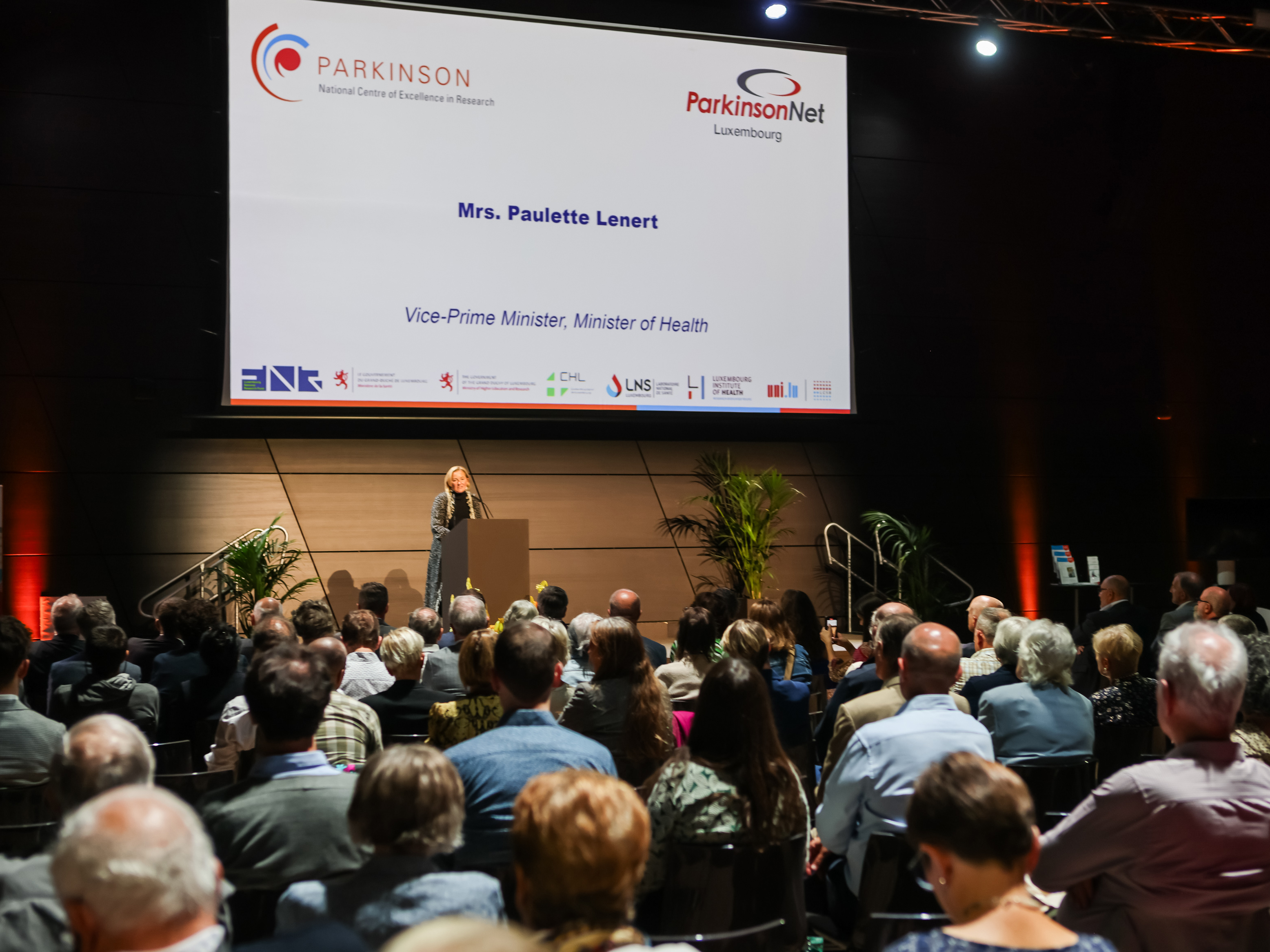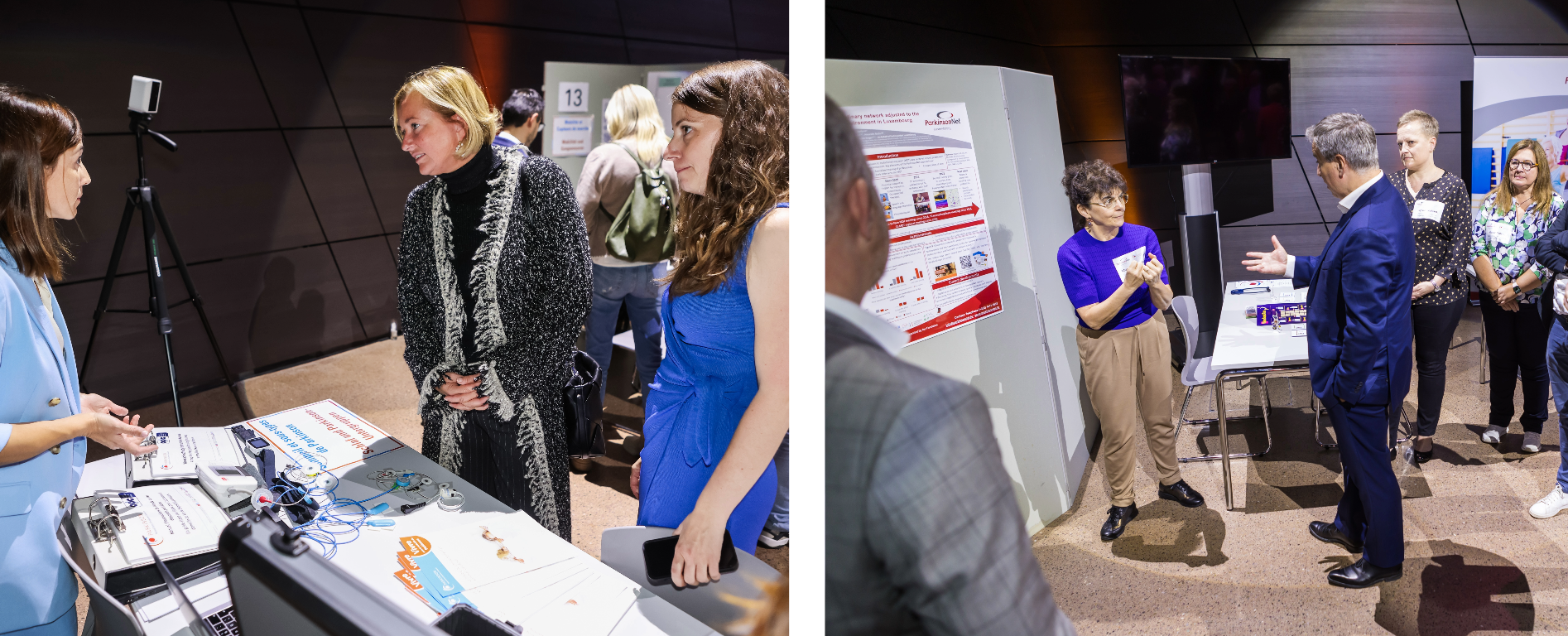
From left to right: Prof. Bas Bloem, Dr. Marc Schiltz, Dr. Romain Nati, Carole Simon, Dr. Sabine Schmitz, Dr. Alex Bisdorff, Nicole Colson, Dr. Jean-Claude Schmit, Claude Meisch, Sylvia Herbrink, Paulette Lenert, Dr. Joëlle Fritz, Alex Kloos, Mariella Graziano, Dr. Anne Kaysen, Prof. Jochen Klucken, Prof. Rejko Krüger
Luxembourg is pulling together its competences on a national scale to provide optimal care for people with neurodegenerative diseases. Following a successful pilot project that ran over the past six years and intregrating the latest scientific advancements from the National Centre of Excellence in Research on Parkinson’s Disease (NCER-PD), the Réseau de compétences maladies neurodégénératives "ParkinsonNet Luxembourg” (RdC-MN) was launched today in the presence of Paulette Lenert, Minister for Health, and Claude Meisch, Minister for Higher Education and Research.
Personalised strategies for meeting patient needs
Faced with an ageing population and a sharp rise in the number of people living with neurodegenerative diseases, a joint effort between the healthcare system and scientific research is necessary. "With this new network, we are going to ensure that every patient receives the best care possible, based on the latest scientific findings," said Paulette Lenert at the opening of the RdC-MN. "ParkinsonNet will initially be aimed at people with Parkinson's disease and atypical Parkinsonian syndromes. The concept will then gradually be extended to other neurodegenerative diseases.”
Neurodegenerative diseases are highly complex. In the case of Parkinson's disease, the causes can be very diverse, ranging from environmental factors to genetic predisposition and lifestyle factors. Moreover, the disease progresses differently in each patient, resulting in distinct sub-groups among those affected. "Because of this complexity, people with neurodegenerative diseases need tailored and personalised care," explains Prof. Rejko Krüger, neurologist and medical coordinator of the RdC-MN at the CHL, professor of translational neurosciences at the University of Luxembourg and director of transversal translational medicine at the Luxembourg Institute of Health. He is one of the initiators of "ParkinsonNet Luxembourg", a concept developed by Prof. Bas Bloem and Dr Marten Munneke of the Radboud University Medical Centre in Nijmegen, which has proven its worth in The Netherlands over many years and has then been tailored to Luxembourg. "To treat neurodegenerative diseases effectively, the different actors within the healthcare sector need to work hand in hand and to always incorporate the latest scientific findings. We have learned together, through ParkinsonNet, that this not only improves patient care but also increases job satisfaction for healthcare professionals."



ParkinsonNet: a multidisciplinary care approach
Thus, ParkinsonNet is characterised by a close collaboration between the healthcare professionals involved and by an increased communication with the scientific community. The neurologists, nurses, physiotherapists, occupational therapists and speech therapists who are part of the team systematically exchange information to determine the best ways to care for people with Parkinson's disease. Soon, the network will also include other health professions such as nutritionists and psychologists, as well as social workers. Together, the members of this multidisciplinary team draw up an individual treatment plan tailored to the needs of each patient and taking account of their personal environment. They also regularly attend additional training courses to keep abreast of the latest scientific findings. "It ensures optimal care for patients treated at home as well as in hospital," emphasised Dr Romain Nati at the event. He is the Director General of the Centre hospitalier de Luxembourg (CHL), the main coordinator of the Réseau de compétences maladies neurodégénératives. "We are convinced that the transition between hospital and home care will be facilitated by improved exchanges and closer collaboration between these two worlds as part of the reseau de compétences," continued Dr Nati.
"Luxembourg is well positioned, thanks to its eHealth strategy, to ensure the interconnection of the various partners in the healthcare system. With the new RdC-MN, digital support for care management is being implemented for the first time, for the everyday care of people with Parkinson's disease," explains Dr Jean-Claude Schmit, head of the Direction de la Santé. ParkinsonNet is indeed developing new solutions for the digitalisation of the network, together with Prof. Jochen Klucken, FNR PEARL Chair for Digital Medicine.


Building a strong connection between research and the healthcare
The role of science was also addressed by Claude Meisch, Minister for Higher Education and Research: "Neuroscientific research is making steady progress and Luxembourg is now established internationally as a major player in the field. We are working on an equal footing with leading research institutions, especially through the National Centre of Excellence in Research for Parkinson's disease (NCER-PD). Its success impressively underlines what a research programme of this kind - with a well-defined mission and designed for excellence - can do to complement conventional research. With the new reseau de compétences, the knowledge gained by researchers will now be quickly integrated into patient care in Luxembourg and thus have a direct impact on the daily lives of people with Parkinson’s disease".

The Luxembourg National Research Fund (FNR) laid the foundations for the new network by establishing NCER-PD as the first National Centre of Excellence in Research eight years ago. "Thanks to this large-scale research programme, involving many participants from Luxembourg and the Greater Region, with and without Parkinson's disease, we now know much more about this disease," said Marc Schiltz, Secretary General of the FNR. "Luxembourg researchers have acquired new knowledge that will help distinguish between the different forms of the disease, diagnose them more accurately and implement precision medicine strategies.” Prof. Rejko Krüger, who has led NCER-PD since 2019 and will now take the programme into a new phase, agrees: "From our point of view, NCER-PD is a success. I am convinced that thanks to this project, carried out in collaboration with the patients and their families, we have built a strong alliance between research and the healthcare system in Luxembourg, which will also benefit people with other diseases in the future."
Partners in the RdC-MN:
- Centre Hospitalier de Luxembourg
- Hôpitaux Robert Schumann
- Centre Hospitalier Emile Mayrisch
- Centre Hospitalier du Nord
- Université du Luxembourg
- Luxembourg Institute of Health
- Société Luxembourgeoise de Neurologie
- Ministère de la Santé / Direction de la Santé
- ParkinsonNet International
- Parkinson Luxembourg asbl
- Members ParkinsonNet Luxembourg [Currently 71 physiotherapists, occupational therapists, speech therapists and neurologists are members of ParkinsonNet Luxembourg and have completed further training on Parkinson's disease].
---
- For more information on the National Centre of Excellence in Research on Parkinson's disease (NCER-PD), see www.parkinson.lu
- Explanations of the most important research successes of NCER-PD over the last 8 years.
Photo: Olivimages



